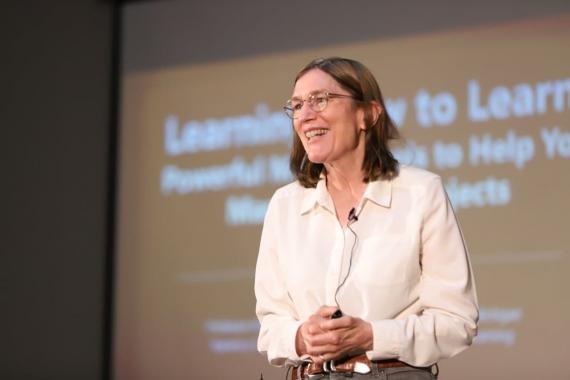
Organised by LUMS and Jazz, the ‘Learning How to Learn’ keynote sessions by Dr. Barbara Oakley were a huge success with a packed auditorium in Islamabad, and over 750 and 600 participants in Lahore and Karachi, respectively. Moreover, the virtual outreach of the talk exceeded hundreds of thousands of viewers who watched the live stream on online platforms.
The talk, ‘Learning How to Learn’, generated a lot of buzz and served as a pioneering platform in Pakistan; bringing together students, academicians, technologists, industry luminaries and experts, as well as large corporate and tech heavyweights.
Conducted by renowned expert Dr. Barbara Oakley, Professor of Engineering at Oakland University in Rochester, Michigan, the event was the result of a recent partnership signed between LUMS and Jazz. This collaborative national initiative, DisruptEd: Ideas that matter, aims to prioritise innovation and digitisation in the landscape of Pakistan through a series of speaker sessions. The partnership in the coming months will raise public awareness, inspire and engage the Pakistani youth and beyond in digital learning, initiate credentialed digital modules and courses through education channels, and disseminate white papers, host conferences and other public events.
Talking about the series, Dr. Arshad Ahmad, Vice Chancellor LUMS said, “It is quite amazing that our children go through a decade or more of formal education and yet, they are never taught how to learn effectively. We can change that now. We can move into the future by providing our students training on a massive scale by reaching directly to students and teachers. We can reach them with high quality materials to convey the best about what we know from research about how students learn effectively. Dr. Oakley gives Pakistan the gift of learning derived from neuroscience and cognitive psychology in practical ways, enabling millions of students to benefit from them.”
Speaking at the occasion, Mr. Ali Naseer, Chief Corporate & Enterprise Officer Jazz said, “The ability for the employees to succeed in the work place is challenged due to the type of learning that does not equip them to be successful. Since companies and businesses are changing over time, the ability of even the brightest students to transform is very limited and constrained. We look forward to how the connectivity platform through Jazz can be leveraged in areas of mobile financial services, education and certainly the DisruptEd partnership with LUMS.”
The keynote session by Dr. Oakley in Lahore was preceded by a panel discussion on the incumbent teaching ecosystem of Pakistan. The esteemed panel included Dr. Arshad Ahmad, Vice Chancellor LUMS; Dr. Tahir Raza Shah Andrabi, Dean Syed Ahsan Ali and Syed Maratib Ali School of Education (SOE); Dr. Kamran Asdar Ali, Professor and Dean, Mushtaq Ahmad Gurmani School of Humanities and Social Sciences, and Mr. Ali Naseer, and was moderated by Dr. Mariam Chughtai, Associate Dean SOE, LUMS. The panel identified the need to replace the outdated teaching model with new methodologies that are widely accepted by all top-ranked universities of the world. Panellists also stressed on increasing academic and industry linkages and encouraging public-private partnerships.
With her vast research on innovative learning techniques, Dr. Oakley elaborated on how the human brain can be stimulated to solve complex problems with ease. Explaining the working of the brain, she said, “Your brain works in two different ways. We’ll call these two ways of working, the focused mode and the diffuse mode. Both modes collaborate and interchange to have proper understanding and learning.” Identifying the difference in modes, she added, “When you’re using your focused mode, you are paying attention and putting specific parts of the brain to work. However, the diffuse mode is when your mind is relaxed and free, while still thinking. So when you are learning something, your brain moves back and forth between these modes, but you cannot be in both at the same time.”
At the Karachi session, the panel discussion, moderated by Dr. Mariam Chughtai, included Dr. Arshad Ahmad, Mr. Ali Naseer, Dr. Tashmin Khamis, Associate Vice Provost, Quality, Teaching, and Learning, The Aga Khan University, and Dr. Anjum Halai, Vice Provost Asia and UK, The Aga Khan University. The panellists stressed on the need to adopt modern day teaching techniques that not only enhance critical thinking but also aid in problem-solving. They also explained how technology and the constructive approach involves more interaction and practical implications, instead of traditional techniques.
Mr. Naseer praised the efforts of all the teams involved, and underscored the importance of the subject matter discussed. “Thank you LUMS for hosting a great event at the Aga Khan University. Although sometimes we may believe we are experts in everything, learning how to learn is one of the most important skills one can possess, especially in a technologically fast changing world.”
Shedding light on the purpose of the talk, Dr. Ahmad expressed that it was a learning opportunity for students, teachers, parents, and professionals from all walks of life to enhance their skill set. “Teaching should be focused on the idea of learning rather than cramming bookish knowledge. LUMS has always appreciated experiential learning and motivated its students to challenge their limits. Jazz and LUMS share similar values about hard work, purposeful learning and using tools to unleash human potential. We both have significant interest in development of our young people. We want to be in partnership with them to take it to places we haven’t reached as yet,” he said.
LUMS has always taken the initiative for growth through progressive transformation. The institution has prioritised innovation and digitalisation as core strategic goals to advance the overall development objectives of Pakistan’s 2025 vision, and through this partnership, Jazz has provided a wider platform to promote innovative methods of digital learning and education.








